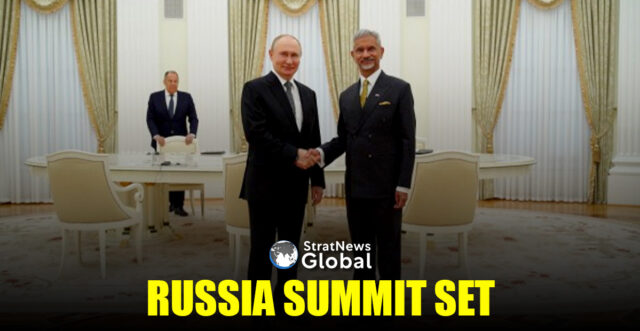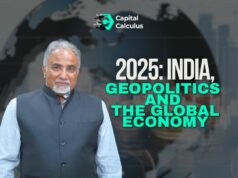External Affairs Minister S. Jaishankar wrapped up a three-day official visit to Moscow on Thursday, where he co-chaired the 26th session of the India-Russia Inter-Governmental Commission on Trade, Economic, Scientific, Technological and Cultural Cooperation (IRIGC-TEC) and met President Vladimir Putin at the Kremlin.
The visit, held from August 19–21 at the invitation of Russian First Deputy Prime Minister Denis Manturov, also saw Jaishankar address the India-Russia Business Forum and hold wide-ranging talks with Foreign Minister Sergei Lavrov.
Lavrov confirmed that President Putin will travel to India later this year for the Annual Summit with Prime Minister Narendra Modi, with Jaishankar’s meetings helping prepare the agenda for the high-level engagement.
The Moscow visit also closely followed National Security Adviser Ajit Doval’s discussions in the Russian capital earlier this month, signalling back-to-back diplomatic moves to inject momentum into the relationship.
The flurry of engagements came as Washington turned up economic pressure. Just days before Jaishankar’s arrival, U.S. President Donald Trump imposed fresh tariffs on Indian exports—25% on goods and an additional 25% penalty on purchases of Russian oil.
A key outcome of the visit was the signing of terms of reference for negotiations on a Free Trade Agreement (FTA) between India and the Eurasian Economic Union. Jaishankar said the deal could help expand trade in a “balanced and sustainable” way, noting the need to remove non-tariff barriers and regulatory hurdles. He flagged agriculture, pharmaceuticals, and textiles as sectors where India could expand exports to correct the trade imbalance.
Energy cooperation featured prominently, with discussions covering oil, gas, nuclear energy, and joint ventures in Russia’s Far East and Arctic. Jaishankar also highlighted long-term fertiliser supplies and the potential for Indian IT, construction and engineering professionals to address Russia’s labour shortages.
Both sides reviewed plans to expand connectivity through the International North-South Transport Corridor, the Chennai–Vladivostok maritime route, and the Northern Sea Route. “These corridors promise to deepen economic linkages, reduce transit times, and expand trade access across Eurasia and beyond,” Jaishankar said.
On defence, he reaffirmed that military-technical cooperation remained “robust,” citing joint production and technology transfer under India’s ‘Make in India’ initiative. The issue of Indian nationals serving in the Russian Army was also raised, with Jaishankar urging Moscow to expedite pending cases.
The discussions extended to Ukraine, Europe, Iran, West Asia, Afghanistan, and the Indian subcontinent. Lavrov repeated Moscow’s opposition to foreign intervention in Ukraine and claimed Kiev was trying to undermine President Trump’s peace efforts. Jaishankar reiterated India’s call for dialogue and diplomacy to resolve conflicts.
The two sides also reaffirmed their shared commitment to reforming global governance structures, including expansion of the UN Security Council. Cooperation in the G20, BRICS and the Shanghai Cooperation Organisation was described as “deep-rooted and forward-looking.”
Responding to Trump’s new tariff measures, Jaishankar pushed back strongly. “We are not the biggest purchasers of Russian oil—that is China. We are not the biggest purchasers of LNG—that is the European Union. We are not the country which has had the biggest trade surge with Russia after 2022,” he told reporters.
“For years, the U.S. has told us to help stabilise the world energy market, including by buying Russian oil. Now we are being criticised for it? Incidentally, we also buy oil from the U.S., and that amount has increased.”
Jaishankar described India-Russia ties as “among the steadiest of major global relationships since the Second World War,” rooted in geopolitical convergence and popular goodwill. He also laid a wreath at the Tomb of the Unknown Soldier in Moscow in tribute to those who died in the Great Patriotic War.
From trade forums to Kremlin talks, the Moscow visit underscored India’s determination to strengthen economic and strategic space with Russia even as the U.S. attempts to squeeze New Delhi with fresh tariffs.
In a career spanning three decades and counting, Ramananda (Ram to his friends) has been the foreign editor of The Telegraph, Outlook Magazine and the New Indian Express. He helped set up rediff.com’s editorial operations in San Jose and New York, helmed sify.com, and was the founder editor of India.com.
His work has featured in national and international publications like the Al Jazeera Centre for Studies, Global Times and Ashahi Shimbun. But his one constant over all these years, he says, has been the attempt to understand rising India’s place in the world.
He can rustle up a mean salad, his oil-less pepper chicken is to die for, and all it takes is some beer and rhythm and blues to rock his soul.
Talk to him about foreign and strategic affairs, media, South Asia, China, and of course India.





